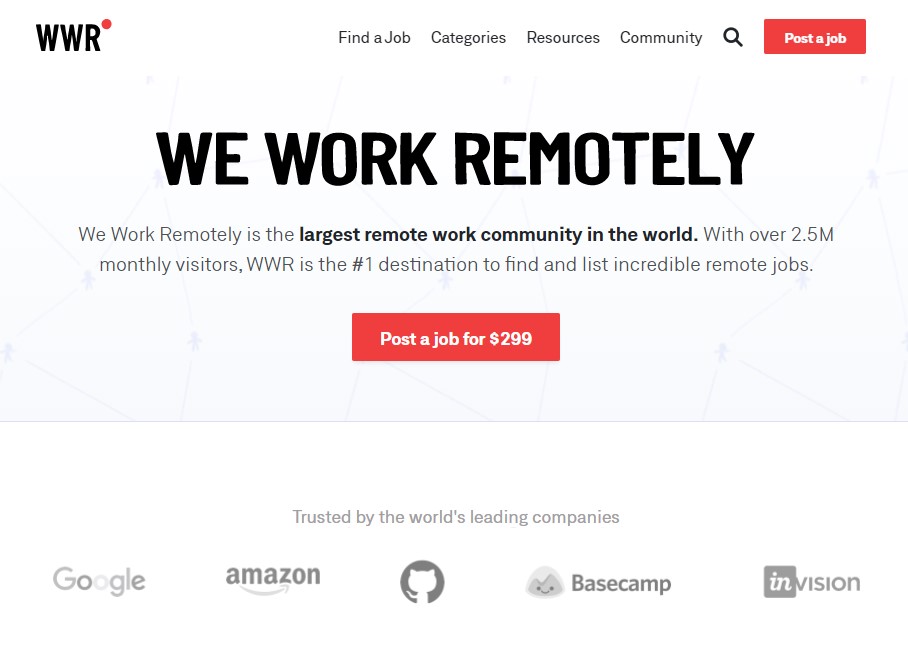The capacity to choose clients, higher earning potential, freedom from time-consuming travel to and from work, and being in full control of your working life are only a few of the upsides of freelancing; professionals can pick hundreds of reasons to be a freelancer.

Table of Contents
What is freelancing?
Freelancing is a contract-based profession where nonemployee professionals use their skills to provide services to multiple clients. Freelance jobs are commonly short-term. Professionals who do freelancing are referred to as freelancers.
A freelancer — also called an independent contractor — is a self-employed individual who is not committed to a particular employer. While in general, freelancers earn money on a per-project basis, some freelancers charge hourly or daily rates for their service. The rates vary depending on the expertise and qualifications of freelancers.
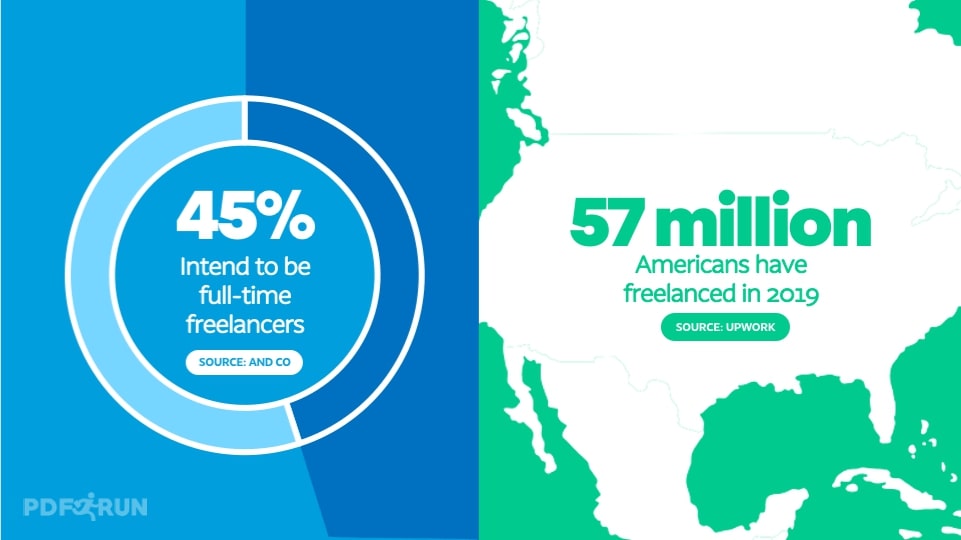
According to a survey by And Co, a business management software designed to aid freelancers in staying on top of their work, 45% of their respondents said they intend to be full-time freelancers.
A similar study by Upwork, a freelancing platform that connects businesses and professionals, and Freelancers Union, a U.S.-based organization that supports independent workers through advocacy and benefits, roughly a third of the U.S. workforce has done freelance work at some point in their career; in fact, over 57 million Americans freelanced in 2019.
Benefits of Freelancing
Today, the demand for freelance work continues to surge. Professionals who are willing to take ownership of their careers by becoming full-time freelancers see long-term benefits even in their personal lives.

Flexibility
Freedom over clients and workload affords freelancers the flexibility to make uninfluenced, day-to-day work decisions. They determine their working hours; since they are their boss, they can work when they are most productive, setting aside the conventional nine-to-five work schedule, as not everyone approves of and works best during the typical office hours. Freelancers can load up on work when they want to, to collect free time for later use.
Freelancing allows professionals to work on their terms and pace, enabling them to spread their energy over various projects to be more productive and dynamic. Not being confined to the nine-to-five workday empowers freelancers to gain better control over their lives and to use their time wisely.
Freelancing also grants the flexibility of working from home or at a place where one can just sit and work undisturbed. Ultimately, no more exhausting commutes.
Limitless earning potential
Freelancers can gain clients from across the world. Due to the flexibility that freelancing provides, they can work with multiple clients despite varying timezones. Opportunities that yield financial benefits are endless in freelancing. For freelancers who possess different skill sets, they can exercise their many expertise by committing to several different gigs.
The income received by freelancers is the direct result of their toil. The effort they put in their work helps determine their earnings. Although monthly earnings can vary month to month, they will not have a maximum amount. Income will vary based on the number of projects handled. Therefore, if freelancers aim to make more money, they need to pick up and finish more work.
Job quality and security
Layoffs are non-existent in freelancing; freelancers do not have to fret about receiving the unfortunate news of untimely dismissal at work. Also, the unspoken expectation that employees need to perform well, to the point of competing with colleagues to keep their jobs, are no longer applicable. Furthermore, freelancing means there are no office politics and time-consuming and unnecessary meetings.
Freelancers do not answer to anyone but themselves — and of course, their clients. And since no one is responsible for their output but them, the pressure to perform is off of their shoulders. Such a benefit motivates freelancers to be better at what they do.
New connections
Freelancing brings professionals together. Since it offers freelancers opportunities to work with different clients across different industries, it gives them additional exposure to other professionals, enabling them to create new business connections. New connections may include new clients, mentors, and potential business partners.
Drawbacks of Freelancing
Freelancers need to recognize that while independent work is fast-growing and becoming a primary choice for millions of professionals, it also comes with pitfalls.
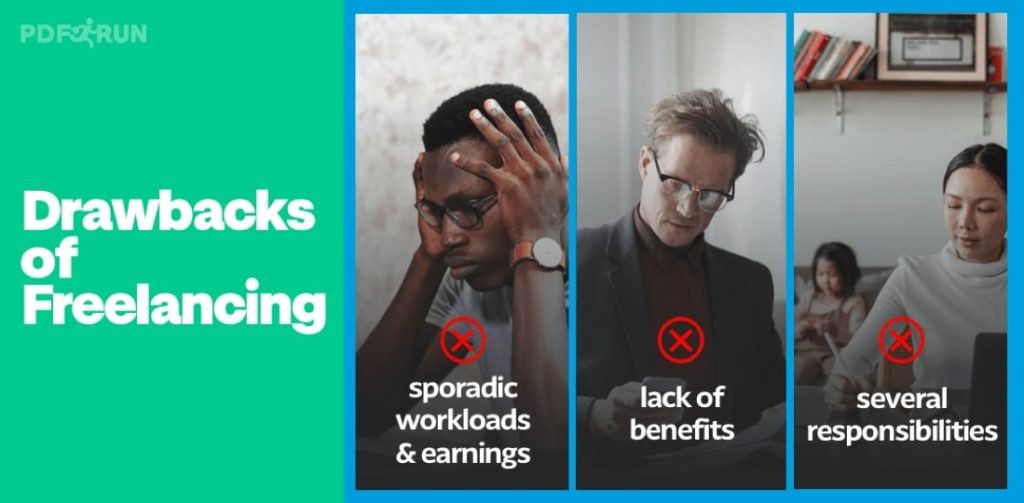
Sporadic workloads and earnings
Stability and consistency are difficult to achieve as a freelancer, as freelancing is often associated with irregular work and a lack of steady income. Projects can start, then be set aside. Contracts may end early. Freelancers may find it hard to look for clients. There would also be instances when they would need to finish much work. Thus, they must learn to manage varying workloads — and income.
While freelancers set their rates, enabling them to determine their income after completing projects, they need to look for several clients to meet their expected — often needed — earnings. Income will vary month to month and can be hard to predict, especially in the early stages of freelancing.
Professionals who left their employment behind also abandoned the security that regular income brings. Moreover, freelancers, unlike employees, do not receive bonuses and cash incentives from employers. They may receive recognition and empowering feedback they can use for self-promotion, but not get additional financial remuneration.
Lack of benefits
Many professionals stay as employees due to employment benefits, including paid leaves, health plans, life insurance, and retirement plans; independent contractors do not receive employer-provided benefits.
Freelancers who want to take a holiday or rest day due to being sick have to come up with a stringent schedule to ensure they can still serve clients and meet deadlines. When they do not work, they do not get paid. Thus, they need to have sufficient money on their personal and emergency funds that they can use to accommodate time-offs.
Health insurance also becomes expensive for them, as companies that avail health insurance for their employees receive volume-based discounts from insurance providers; freelancers need to pay the set premium.
Several responsibilities
Freelancers need to wear different hats that entail different responsibilities daily. They are no longer solely responsible for their personal growth. Now, they are compelled to sustain their professional growth and make it prosper without assistance from anyone.
No matter how skillful an individual is, having a mentor is beneficial. A mentor can offer sound advice and guidance. In an office setting, a mentor can be an accomplished and knowledgeable senior, a boss who can coach an employee as they work together. When freelancing, independent workers need to learn on their own, hire a coach, or join organizations.
When professionals transition from being full-time employees to freelancers, they become in charge of all their primary workflow processes, such as business development, marketing, client management, and finance-related processes, on top of doing the actual tasks required by clients. Freelancers become the single person responsible for all legwork.
Freelance Jobs
The number of freelancers continues to increase as the demand for freelance jobs also grows. Freelance jobs can be long-term or short-term, depending on the requirements of the projects and clients. Here is a roundup of the most sought-after freelance gigs right now:

Writer or copywriter
People are exposed to and consume thousands of blogs, e-books, press releases, research documents, news articles, and advertisements daily. Thus, many companies are consistently on the lookout for writers to join their team. Freelance writing jobs are suitable for people who have a knack for writing creative, engaging, and educational content, and aspire to be an instrument in disseminating valuable information. They can favor the writing gigs for topics that interest them.
Editor or proofreader
Experienced writers who are experts at grammar and syntax and have a sharp eye for detail can become freelance editors and proofreaders. They will review and correct written content for websites and articles for publications, including books, magazines, directories, and academic papers. To become an editor or proofreader, a freelancer must have highly developed writing and editing skills.
Online tutor or teacher
Freelance online tutors or teachers provide private learning sessions to help students enhance their knowledge and develop new skills. Online tutoring and teaching can often even pay more than regular full-time teaching. From tutoring elementary and middle school students on different academic subjects to teaching a businessman to play an instrument, online tutoring and teaching offer freelancers the flexibility to work on their preferred hours. Being an expert on a specific field of study paired with a high level of social skills can bring success to online teachers.
Creative designer
Creative design is wide-ranging. Freelancers can become brand identity managers, graphic designers, digital illustrators, logo designers, among other in-demand creative design positions. Aside from being innately creative, creative designers should be familiar with graphic design and publication design software. Today, the most popular tools creative designers use are Adobe Creative Cloud, Microsoft Powerpoint, Keynote, and Canva.
Web developer
Web development jobs offer a lucrative gig. Web developers assist companies in building websites to establish their online presence. They also help create webpages for branding, marketing, and selling purposes. Freelance developers can specialize in different development areas such as front-end and back-end. Front-end developers write codes and turn them into a graphical interface. Back-end developers are the ones who focus on the internal structure of a website by tending to functions that make a website up and running. Nonetheless, web developers should be skilled in programming software and languages, including JavaScript, CSS, HTML, Ruby, Python, and SQL.
Photographer
Freelance photographers can focus on a certain market or be a jack-of-all-trades. Being a photographer requires a natural ability to capture objects and moments skillfully. While his photos could center on a specific niche or show the same subjects, he could be an expert on several subjects, such as weddings, wildlife, fashion, portraits, lifestyle, pets, music, and arts. An impressive and relevant portfolio is mandatory to gain clients for this job.
Virtual assistant
All the tasks freelance virtual assistants do vary and depend on the needs of their clients. In general, their duties are the same as the duties of office assistants. Their tasks often include administrative support, secretarial duties, and client management and support. To become a virtual assistant, clients require one to be skillful in basic computer software, adaptive, quick to learn, and have the tools needed to work efficiently such as a computer or laptop and a stable internet connection.
Is freelancing for me?
Freelancing has its perks — tempting, innumerable advantages. Flexible work schedules, no long monotonous commutes, and limitless income potential to name a few. However, while professionals can easily quit their full-time employment to gain absolute control over their working life, not all have the ability and determination to become and remain as freelancers.
According to Freedom Wanderers’ blog on creative freelancing, a professional must have an unshakable purpose behind the decision of becoming a freelancer; a freelancer must have a motivation that is beyond just earning.
How do professionals assess if they are suited to be freelancers? Through level-headed self-evaluation. By asking themselves the right questions, they can gauge if they qualify to be an independent contractor.
Why do you want to become a freelancer?
Becoming a freelancer for wrong or petty reasons will make a professional quit in times of difficulties.
Freelancers need to have fool-proof and flexible strategies before diving into the world of freelancing, as it demands a relentless drive and solid motivation. There will be nerve-racking and time-sensitive issues that would require immediate solutions; otherwise, they would lead to more problems.
Freelancing is hard to sustain and growth can be slow. An individual should not decide on a whim to shift from being an employee to a full-time freelancer. For many, a career as a freelancer holds the promises of a potentially higher salary and manageable work schedules, but not everyone is fit to become a freelancer.
Are you willing to learn new skills outside of your expertise?
Freelancers should be adaptable and willing to learn the skills needed to succeed as an independent worker. Writers should not only be expert wordsmiths but also sociable and ready to meet and talk with clients and people who may be relevant to complete projects. Web developers need to learn to write business proposals to win prospective clients.
When professionals decide to be self-employed, they welcome new responsibilities, including becoming an all-around marketer, tax expert, and client manager.
Does constantly taking risks sound appalling to you?
Freelancers commit to a life full of taking risks. Possible delays in receiving paychecks, erratic workloads, and unsteady flow of income are just a few of the uncertainties that they encounter every day. Even experienced freelancers are no strangers to all types of risks involved in freelancing.
While freelancing may not be riskier than any employment, freelancers carry the risks on their own; a freelancer is solely responsible for the consequences of taking risks.
Freelancers should always have well-thought-out backup plans to mitigate the consequences of failed attempts to stay on top of their working life and to achieve a sense of stability. Taking risks is inevitable but rewarding when the risks become wins.
Are you prepared to be your own boss?
The traditional employment setup offers a structure that employees only need to satisfy, sustain, and support. Freelancing demands building a structure from scratch. Therefore, freelancers should be their own leaders, initiating strategies and implementing plans to improve processes to sustain being freelancers.
Freelancing Essentials
Would-be freelancers need to gear up and be well-informed about indispensable freelancing practices to succeed. From setting up a workstation to completing tax forms, the following key points will equip and empower professionals as they pursue a path to becoming an independent worker.
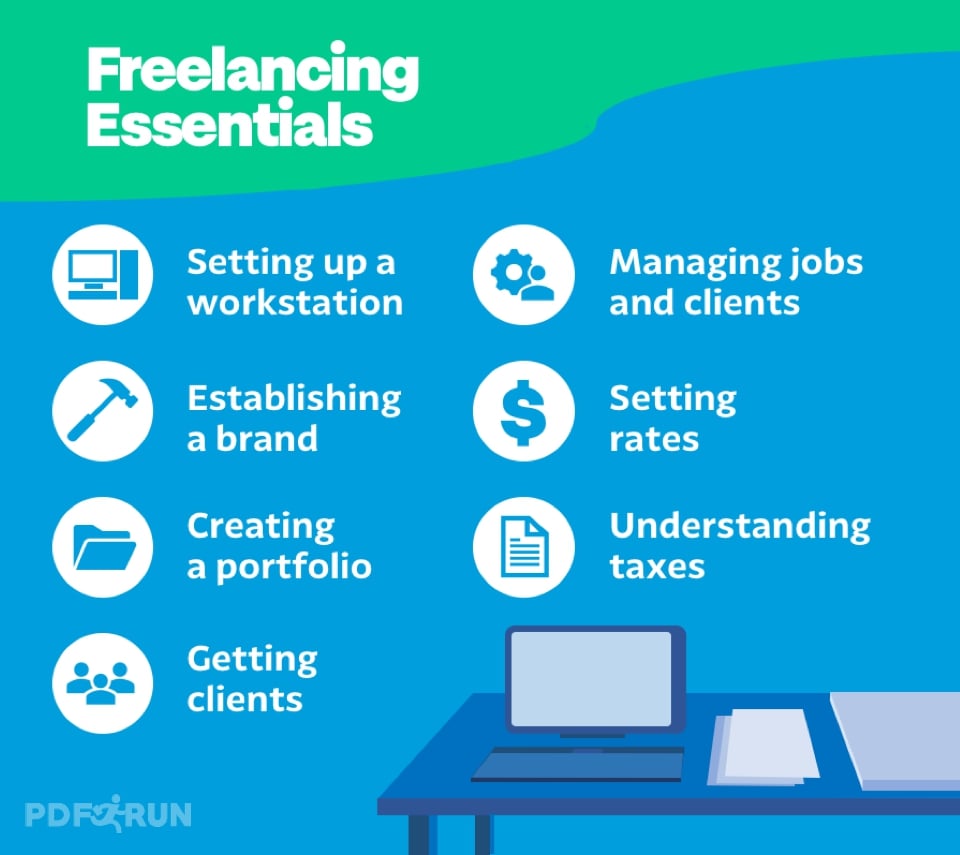
Setting up a workstation
Professionals can convert a corner space or a spare room into an office. If a professional lives by himself, setting up a workstation is easy; he only needs to think about his comfort and how to arrange the equipment and tools he needs to function. If he has housemates, the biggest concern would be getting distracted; therefore, his workstation should not be where people regularly walk or stay.
It is worth acknowledging that working at home comes with distractions. The bed becomes more attractive and the pile of laundry seems to need urgent attention. Therefore, setting up a workstation away from potential sources of distractions is advisable.
Working at a local coffee shop or a co-working office is an option for freelancers. According to Running Remote, co-working spaces are a great way to be part of a community and to network with like-minded professionals. Public libraries are also available for freelancers who do not want to spend money at a coffee shop or co-working office.
Establishing a brand
Competition is tough among freelancers. Even the most booked and seasoned freelancers need to level up their personal branding efforts consistently to retain clients and get more gigs.
Building and establishing a personal brand makes a freelancer stand out from the growing competition. It is critical to notice that freelancers are becoming more and more skilled in their respective fields.
Freelancers can start building their personal brand by creating a unique and remarkable name for their business. Having a logo to visualize their personality, values, and the services they offer is ideal.
They can fasten their presence in their respective industries by creating online profiles aside from word-of-mouth promotions. An online presence establishes credibility. Freelancers can create business profiles on LinkedIn, Behance, Twitter, and Facebook among other social media sites.
A freelancer can create his website that can serve as both a resume and a portfolio. A website may also house a blog where he can share his thoughts and knowledge to help him establish his credibility and expertise.
Creating a portfolio
A portfolio is a collection of documents, work samples, and testimonials from former clients that showcases the capabilities and suggests the work ethic of a professional.
No matter the expertise of a freelancer, it pays to have a portfolio that would help potential clients gauge his skills and see if he fits their requirements for an independent contractor. A portfolio does not need to contain all the past projects of a freelancer. Only those that are most important, worthy to highlight, and relevant.
Providing brief yet substantial descriptions of the processes that went into the creation of a specific project, including hindrances and challenges, allows a potential client to identify and address early the possible future setbacks. Aside from using previous issues while doing past projects as a way to prove that a freelancer knows how to face and defeat difficulties, doing so could result in better coordination between him and a potential client.
Aside from an informative portfolio, a freelancer should have a compact yet informative resume. A resume is a primary document that professionals use to market themselves by displaying their top skills and qualities and to convince potential clients to hire you.
To create an effective resume, freelancers can utilize online resume builders that provide customizable resume templates. These sites enable professionals to produce powerful resumes in minutes. They may also fill out and submit a job application form to potential clients.
Resume-Perfect is one of the go-to online resume builders. It assists professionals in creating a cohesive resume using its customizable templates for different jobs.
Getting clients
When professionals start to work as freelancers, the initial goal should be to have only a handful of clients. Working with more than five clients when starting as an independent contractor is unwise. Freelancers, observing prudence, must first establish routines and workflows, investing in building their portfolio and network without rushing.
A strategy for freelancers to gain clients is to let people know about their expertise. They can reach out to owners or managers of existing products and provide critical points on how the products can improve, offering their skills to attain the suggested improvements.
Using their contacts and networks, freelancers can get assistance in finding clients through referrals. Moreover, they can talk to freelancers in their field to gain insights about getting clients and expanding networks. Other freelancers are not necessarily competition; they are valuable professionals who can share knowledge and connections.
Independent workers can utilize job boards to inform companies that have existing or upcoming projects geared towards freelancers of their qualifications. Some of the best and most popular freelance job sites are:
-
-
- Upwork — Upwork has thousands of opportunities for freelancers no matter their expertise to work with businesses and professionals from different industries.
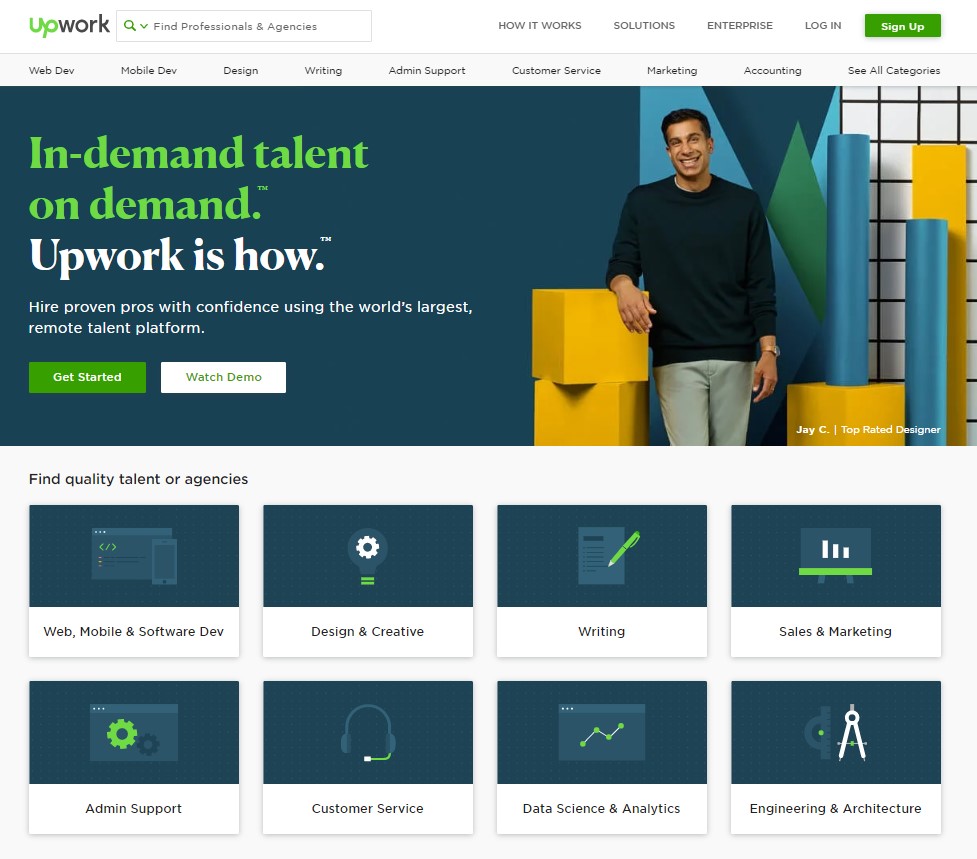
- Freelancer — From delivery to website development, Freelancer lets independent professionals find jobs that suit their skills and qualifications.

- We Work Remotely — With over millions of monthly visitors, We Work Remotely regularly updates its database of gigs, allowing freelancers to have thousands of freelance job options.
-
Building an online presence through social media is also an effective way to land freelance jobs.
Managing jobs and clients
Since freelancing offers independent professionals countless opportunities, projects can pile up and clients can become unhappy. While there is beauty in the truth that freelancing constantly introduces new projects to take on, managing jobs and clients should never take a back seat.
Freelancers need to prioritize organizing not only their time but primarily their projects and clients. Tracking the progress of each project using digital tools such as Google Spreadsheet or project management applications and communicating clearly with clients can establish a work structure beneficial to them and their clients.
Benjamin Franklin said, “If you fail to plan, you are planning to fail.” Planning is of utmost importance in freelancing, as diligence results in long-term success.
Managing jobs and clients also means managing private information. A non-disclosure agreement is useful in establishing a confidential and secure relationship between freelancers and their clients. The document ensures that the parties involved will protect and not disclose non-public information covered in the contract.
Setting rates
Deciding how much to charge is a problem freelancers regularly face. While skill sets and credentials play a role in determining rates, factors such as cost-of-living expenses and costs of doing projects are also worth considering. Freelancers need to make sure that they are earning enough to sustain their living and being an independent professional.
In general, most clients will not hesitate to pay freelancers higher rates just to make sure they will receive quality outputs. They expect them to deliver consistent value that exceeds expectations.
Freelancers can start at an hourly rate. Such an arrangement will guarantee that clients pay them for the time they work. The hourly rate should depend on the quality of the expected results. Rates can also be on a per-project basis. To set the proper rate for a project, freelancers should assess all the processes that go into its completion and determine the costs that each process requires.
Clients who have decent budgets would require no less than excellent outputs; therefore, the more complex the project is, the higher the rates should be.
Being part of a community of freelancers is useful in setting rates. Freelancers who have no idea or quite uncomfortable setting their rates can ask their peers for tips and guidance.
Overall, when establishing rates, freelancers should keep the value of their services in mind. Undercharging due to hesitation to demand more from clients seems easier than overcharging, but freelancers should respect the value of their time, effort, and expertise.
Understanding taxes
While freelancers forgo the laborious tasks a full-time employment demands, including waking up to a raucous alarm clock and commuting for long hours daily, the responsibility of filing taxes is entirely theirs. Nevertheless, freelancers do not have to pay taxes with each invoice or paycheck.
At a full-time job, an employer takes out Social Security and Medicare taxes from the paycheck of an employee, taking care half of the tax amount required by the Internal Revenue Service (IRS) Since freelancers are considered both an employer and an employee, they need to pay both as an employer and an employee. The self-employment tax rate is 15.3%.
Freelancers should receive Form 1099-MISC from all clients that paid them $400 or more. For payments made using online payment systems, they might receive Form 1099-K; however, only when a client paid a freelancer more than $20,000 or more than 200 times is he required to issue a Form 1099-K. Freelancers still need to report their earnings to the IRS despite not receiving a Form 1099.
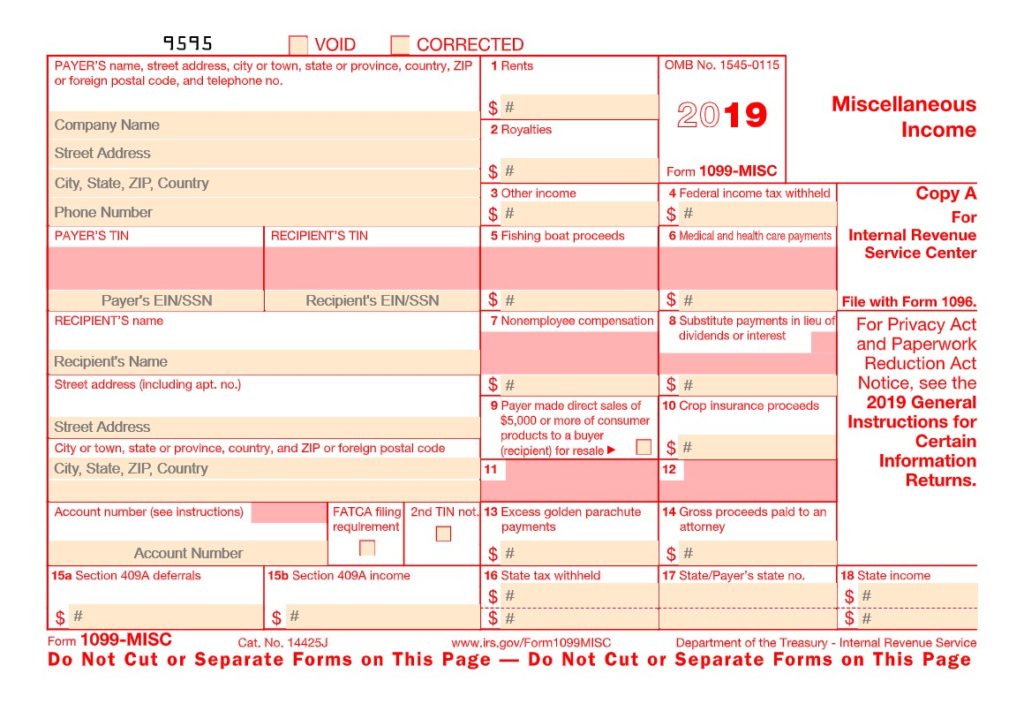
Freelancers who earn $400 or more in a tax year are required to file taxes. Form 1040 is the tax form they will use to file their annual tax return. They can also calculate and pay estimated taxes using Form 1040-ES if they expect to owe at least $1,000 in taxes during a tax year. The quarterly due dates for estimated taxes are the following:
-
-
- First payment — April 15
- Second payment — June 15
- Third payment — September 15
- Fourth payment — January 15
-
For other tax forms, freelancers can browse PDFRun’s online library of legal forms. PDFRun is a web-based PDF editor that provides individuals and businesses access to thousands of fillable legal and business documents and forms. Aside from its feature-rich editor, it also offers electronic signature solutions, streamlining e-signature workflows.
The Bottom Line
Some professionals do freelance work to supplement their day job in hopes of earning extra income. Some individuals downright prefer it over full-time employment. No matter their reasons, freelancing is not for all. Nevertheless, shifting from full-time employment to freelancing has unparalleled advantages that far outweigh its downsides.
If you are considering becoming a freelancer, ask yourself: “Am I ready to take on the challenge of being an independent professional?”
